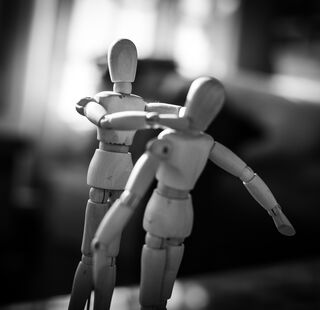Religion
Why Bad Behavior is on the Rise
COVID was just the tipping point.
Posted May 11, 2022 Reviewed by Gary Drevitch
Key points
- In the last decade, law and religion appear to have had less of a restraining effect on how Americans behave publicly.
- Only a small percentage of adults do the right thing because it is morally right, according to Lawrence Kohlberg.
- Thwarting the rules of society becomes more prevalent when modeled by powerful influencers.

There was a time when most people followed society’s mandates for the common good. There have always been outliers—but after two years of COVID, the escalation of ordinary citizens’ bad behavior is hard to ignore. Some cite the pandemic restrictions and demands to explain unruly, inappropriate, and dangerous behaviors. While I agree that COVID’s lengthy shutdown did exacerbate tension and acting-out behavior, I think there are several other root causes to consider.
One explanation is the weakened cornerstones of our societal structure. Before there were laws, religion used to keep human bad behavior in check. But there's evidence that religion has ceased to be the significant influence it once was in deterring bad behavior. According to a Gallup poll in 2021, U.S. church membership was 73 percent when Gallup first measured it in 1937 and remained near 70 percent for the next six decades, before beginning a steady decline around the turn of the 21st century. Americans' membership in houses of worship continued to decline last year, dropping below 50 percent for the first time in Gallup's eight-decade trend.
Beginning with the 10 commandments, or even before, the fear of displeasing God or sinning was enough for most people to curb their vengeful human urges. That deterrent has lessened. We need new incentives for being kind and fair.
When people are not guided to do the right thing by religious principles, laws tend to keep them in check. But in the last decade, laws, which include government agency dictates, may be having less of a restraining effect on American society—because more people are disregarding them, emboldened when consequences aren’t significant. These two variables—the lessened effect of religion and disregard for laws—may help to explain why there is more civil disobedience, and the pandemic may simply be the metaphorical straw that’s breaking the camel’s back.
Taking the law into one’s own hands and refusing to accept its authority fits within the ideology of anarchism whereby individuals aspire to achieve uninhibited freedom, eschewing authority and failing to recognize the mandates of government. There have probably always been anarchists who refused to follow rules, but now, two decades into the 21st century the practice of resisting, challenging, or thwarting the rules of society has become more prevalent, modeled by powerful influencers.
Here's another contributing factor. Mid-twentieth-century psychologist Lawrence Kohlberg studied moral development from childhood through adulthood. Most late adolescents and adults internalize the values of their community and role models, but few demonstrate more abstract reasoning that would lead them to consider others’ beliefs, ethics, or opinions, which sounds like an absence of empathy.
Kohlberg’s findings suggest that only a small percentage of adults do the right thing because it is the morally right thing to do. A much larger percentage do the right thing when they run the risk of being found out and held accountable by their neighbor, community, or the state.
Rules of civility and justice in American life are Increasingly being ignored by individuals who might have been considered on the fringe of society a decade ago. But the prevalence of top political leaders who model the thwarting of societal norms gives the fringe, on the right and left, permission to act out more with less of a threat of being punished.
Gun violence increases because the consequences of owning and using a gun are diminished. Attacking mask wearers in a store is bad behavior by those who thwart the rules, because thwarting the rules satisfies their anarchistic tendencies. They cannot recognize or don’t care about the greater-good benefit. Previously, religion and the law were often considered valid reasons to exercise more self-control, if only because it was the right thing to do, a moral justice decision.
Pandemic inoculation was also met with resistance and challenge by a sizable minority. When smallpox threatened America, the Vaccination Act of 1853 made it mandatory for all children to be inoculated—for the common good. Today there is pushback and sometimes even deadly challenges. Why? Because for an increasing number of people, what they want and believe trumps societal needs. It’s tolerated. Therefore we’re likely to see more of it, as copycat behavior demonstrates. And the pandemic restrictions, amped-up stress, loss of loved ones, job changes, and child-care, certainly didn’t help.
What’s the solution? I am a psychologist and not a politician or theologian. But if political leaders could attempt to come together for the common good or at least agree to disagree civilly, it would be a start. People are watching. Internet sites that make provocation seem desirable continue to grow in influence. The lack of consequences makes bad behavior look appealing and doable. It would help if, individually, more of us might take a slow, deep breath before responding to whatever irritates us, and think about the consequences not only for ourselves but for others. News that doesn’t distort would also help.
Going beyond Kohlberg’s stages, it would help to teach empathy—the ability to put yourself in someone else’s shoes and try to see the world from their perspective—and compromise for the common good. In our individualistic society, empathy is a concept that can be developed to a much greater degree.
The good news is that Americans are generous, creative, and good problem solvers. As Martin Luther King, Jr. once said, “The arc of the moral universe is long, but it bends toward justice.” We can find our way.




